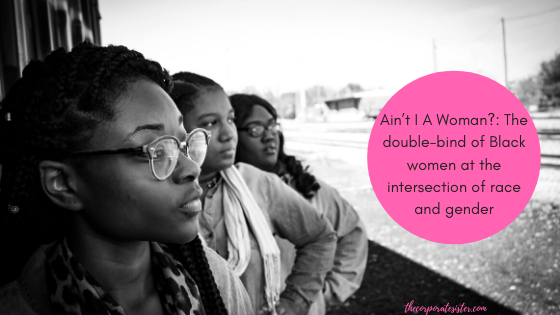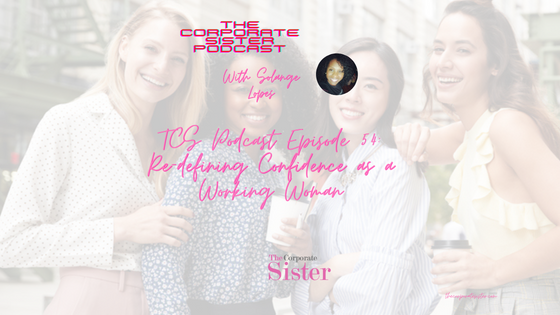“That man over there says that women need to be helped into carriages, and lifted over ditches, and to have the best place everywhere. Nobody ever helps me into carriages, or over mud-puddles, or gives me any best place! And ain’t I a woman? Look at me! Look at my arm! I have ploughed and planted, and gathered into barns, and no man could head me! And ain’t I a woman? I could work as much and eat as much as a man – when I could get it – and bear the lash as well! And ain’t I a woman? I have borne thirteen children, and seen most all sold off to slavery, and when I cried out with my mother’s grief, none but Jesus heard me! And ain’t I a woman?“
Sojourner Truth, “Ain’t I a Woman“
In the words of Sojourner Truth, known for her historical speech at an Ohio Women’s Rights Convention in 1851, what’s it really about being a Black woman? As I read her words, what does it really mean to stand at the intersection of being Black and female? What does it mean in the workplace, on the streets, at home? What does it mean to live in the body and the mind of a Black woman?
Being a Black woman means being at the intersection of race and gender. It also means being stuck in a professional and personal double bind, that of race and gender. The powerful, feared and harsh combination of two minority statuses rolled into the same individual and exposed for all to see, against the brutal misconceptions of society and oneself. It is the mix of negative messaging, insecurities and stereotypes channeled from one inequitable position to another, fused in a confusing cloud of misperception and misalignment. It is the conundrum of belonging in a partial way, which really is synonymous with not belonging at all. Stuck between a rock and a hard place…
As a woman, you feel like you are to join hands with all women. As a Black woman, you may be very well on your own, at tables where you may be the “only one”, in discussions where your voice may either sound like an empty echo or a gritting scream, or just a resounding silence… On paper, you may be deemed worthy, but in numbers, your value may be discounted. On paper, you may be read as “strong”, “invincible”,yet as the likes of powerful athlete Serena Williams and talented comedian and actress Leslie Jones, too “masculine-looking”. Or even as an “ape in heels”, as First Lady Michelle Obama was once insultingly portrayed.
Being at the intersection of anything also means residing at the periphery of everything. It’s an uncomfortable, trying place where one constantly has to prove their worth, even to themselves. A place of guilty, both conscious and unconscious, betrayal at the hands of oneself and society. A place where every step is on the lava floor of racial and gendered identity, and the pain, confusion and saving grace of growth that come with it…It’s a place no one really chooses to be in, for no one really picks the in-between, unless there is the threat of fire on both sides..
Being a Black woman is asking the question: “Ain’t I a woman?”, over and over again, at the meeting table, in the family conversations, in the mothering of our children, in the soothing of our own souls…It’s also getting multiple, sometimes conflicting answers to the same heartbreaking query, and often settling for only a fraction of the right ones. Settling for a fraction of the right salary…Settling for a fraction of the credit, a fraction of the peace, a fraction of the life…
Yet, navigating both realities of being woman and Black does not necessarily equate settling for the eternal dance between identities, codes and communities. One can take a stand and cut the pie in the middle. One can choose both, and have both. Yet, as for all progress, taking a stand, especially taking a middle, all-encompassing, stand comes at a price. It’s the price of embracing all of who we are, the multiple reflections of growth and evolution, as well as the entrenched images of self in a larger-than-life picture of what it truly means to be human. For being human is being a well of complexity, a receptacle of harsh contrasts and soft similarities, a deep pit of conflict and peace, of oneness and uniqueness. Being human is messy. And so is being a Black woman, at the intersection of race, gender and all of humanity…
It means letting of the lethal ideology of comfort and apparent belonging, to embrace the fearful uncertainty of the redeeming human difference. There is no comfort in progress and advancement. And isn’t that what we’re after, as a people, as a human race? Isn’t the fruit of struggle coming out of the seed of discomfort and difference? Neither is there belonging in the very concept of expansion, as an individual, as a society, as a world. Birth, from that of a human being to that of an organization, is synonymous with the very expansion that creates the same belonging that it negates later on through the necessity of emancipation and growth.
It means replacing the short-sightedness of immediate results, with the long vision of impact. How is our stance, at the corner of race and gender, creating the needed impact to open doors at all the levels we’re playing a role in? How is representation being increased, instead of limited and selective, by the sheer impact of our presence, the resonating weight of our voices, the long reach of our hands lifting and raising across lines of gender and race?
Last but not least, it ultimately means creating the support we need to serve those who don’t yet know they need it too. For it is when we recognize the needs of others, that we touch our own needs, minister to our own hearts, and heal our own wounds. Support is healing, and healing knows no boundaries. It expands across lines of identities and conceptions, to encompass the heart of humanity at the intersection of being human and being well,… human.
“Ain’t I a woman”, said Sojourner Truth. For at the intersection of race and gender, is the infinite view of what it means to be beautifully human, complex and boundary-breaking.
The Corporate Sis







